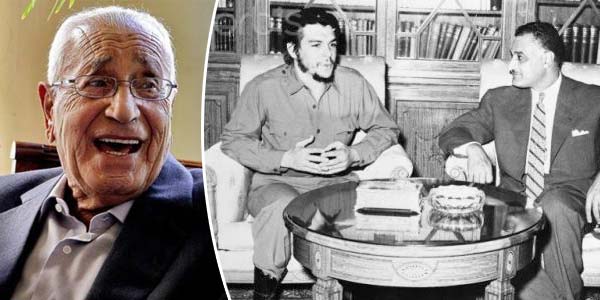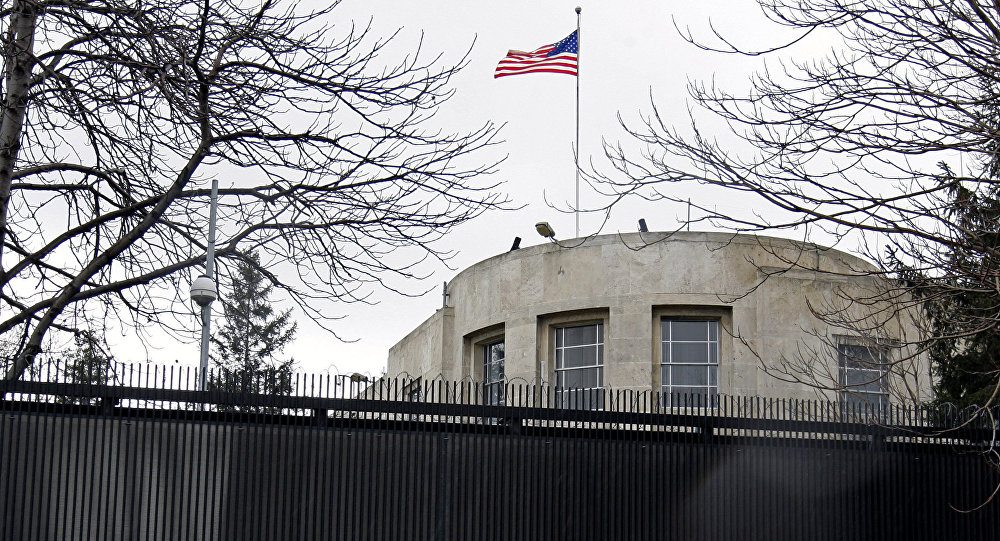So this suspicion of American support combined with his suspicion of Castro’s theatricality and his own preoccupation with events in the Middle East made Nasser shy away from involvement with Castro and his bearded, booted followers. (1)
In his 1973 book The Cairo Documents, Mohamed Heikal devotes an entire chapter to his observations of Egyptian military leader Gamal Abd en-Nasser’s interactions with Fidel Castro, Raul Castro, and Che Guevara. For someone reading it forty years later, Heikal’s attitude towards the Cuban revolutionaries is interesting because of his generally paternalistic tone. Writing less than fifteen years after Castro’s guerillas took control of Cuba, Heikal looks at them as upstarts who yet have plenty to learn about the world.
On the other hand, there are many young leftists even today, including especially Guevara fans, who would be disturbed by Heikal’s account. Many decades have passed since Che became a romantic icon of the left, a status that he has retained in the comfort of the post-Cold War world. Against this background, I find some of Che’s comments (as recounted by Heikal) quite illuminating. Fundamentally, many young leftists today still have not digested the lessons that Che, too, could not digest from the Cuban experience.
According to Heikal, Guevara’s first visit to Egypt in 1959 did not help develop ties between the two régimes because Guevara was convinced that the success of a revolution was proved by the number of people forced to flee the new system. Nasser was unimpressed by such an attitude, stating that his revolution was aimed at “liquidating the privileges of a class but not individuals of that class” (2). Nasser, who came from Egypt’s military officer class and helped lead the 1952 overthrow of King Faruq, understandably had little sympathy for the Cuban revolutionaries’ radical and violent class ideology. On the surface, at least, Nasser’s approach was a more humane approach than that of Castro and his comrades.
By the time Guevara paid a second visit to Cairo (in 1965), Nasser had changed his view of the Cuban revolutionaries as a result of being impressed by their mettle during the failed U.S. invasion of the Bay of Pigs and the 1962 missile crisis. Heikal writes that Guevara seemed depressed and disillusioned, so Nasser pried information out of him concerning the trajectory of Cuban affairs. Guevara told Nasser that in Cuba the problems had begun after the revolution’s first success, because it was then that the business of constructing a socialist system actually began:
I used to talk a lot about social transformation. Then I was given the task of supervising that transformation. The first problem that greeted me was finding the people to run the nationalized concerns. We found them and we thought they would be representatives of the revolution. But we found they did not belong to the revolutionary party; they belonged to the managerial party. They forgot their revolutionary fervor in the arms of beautiful secretaries, in their lavish cars, with their privileges and their air-conditioning. (3)
In other words, the Cuban revolutionaries ran into the problem of human nature. A very real issue that Marxist revolutionaries have not been able to find a solution to is the simple fact that most people are not strongly motivated by ideology. The Soviets tried to deal with this difficulty by applying overwhelming state coercion and propaganda, but that grand, murderous, and ultimately unsuccessful social experiment ended in 1991. In China, Mao tried to sustain revolutionary fervor through an equally catastrophic Cultural Revolution, which cost some tens of millions of lives, and virtually as soon as Mao died in the mid-1970s, the CPC’s relative realists took over, shifting the Chinese economy towards more and more profit-motivated production.
After Guevara complained about the trade attitude of the Soviets (they wanted market value for their manufactures), and Nasser explained that both material and social infrastructure were necessary for a successful revolution, Guevara and Nasser discussed the difficulty of constructing an industrial economy:
Guevara said that to build and to manage a factory was a very difficult business. He thought that the most gratifying aspect of a revolution was political activity among the masses and that running factories was a dull, depressing business. Nasser said that mobilizing the masses came in the romance stage of a revolution…. And that was what a revolution meant: it meant going through the dull, difficult business of building factories and reclaiming land. (4)
Of course, building and managing factories, distributing products, and developing technology is the essence of industrialization, regardless of whether a particular economy is capitalist or socialist or maybe a mixture of both. Later during his 1965 visit, Guevara accompanied Nasser on a tour to the Aswan High Dam. Heikal quotes Nasser as saying to Guevara:
But this is the revolution. Those sacrifices [referring to expenses for the Aswan High Dam] are the revolution. Working day after day to put rock beds in place, build tunnels, install machinery. That is what changes society. (5)
Clearly, the problem that Che could not face is the fact that in anything beyond the short run, normal citizens of a society are more interested in the products produced by those “dull” factories than in continuing to fly on the wing’s of the state’s ideological rhetoric. Assuming that Heikal’s account is accurate, we can see that Che did not like the essential reality of economic existence in the modern industrial world, and instead wanted to continue living the romantic revolutionary’s dream. So I guess it’s a good thing that he didn’t live to see Castro’s son partying in Bodrum (6).
Moreover, Egypt’s current condition shows patently that there is more to industrialization than just building dams and factories. Society also changes, but that change happens neither top-down by fiat, nor overnight. Social change happens over time and with a multiplicity of factors working together. Only politicians who are attuned to the real attitudes and conditions prevailing in society can formulate policies that will receive support from that society. Most likely, this is the reason why the most successful, stable industrial economies are framed by republican and democratic political systems.
In Turkey today, the fundamental problem facing those on the left-of-center is even more dire than what Che faced: they don’t understand, or even like, the business of organizing the people. Forget about the nitty-gritty of learning how to run a modern industrial economy; the Turkish left doesn’t even like to get out and knock on doors, shake hands, and kiss babies. This was illustrated grimly after the Gezi Park protests/riots/commune when the “park forum” movement fizzled. Now, more than three years after June 2013, no perceptible political movement has emerged from the Gezi Park incidents. There are a number of reasons, but the most damning is the simple inability of Turkish social activists to organize in a complex manner, and to appeal to the mass of Turkish society. For most Turkish social activists, “fighting for the cause” still consists of parading down İstiklal Street with a few hundred like-minded friends, then bumping chests with the cops, tweeting about it to their friends while it is happening, and later posting inflammatory messages and pictures of the mêlée on Facebook or Instagram.
Meanwhile, the AKP has gone through a literal trial-by-fire over the past fifteen years. Originally, AKP governments featured the typical ministers, obviously incompetent or possessing questionable ethics, that provided great material for satire. Figures like Atilla Koç or Kemal Unakıtan tarnished the government’s image for many years. But over time a learning curve has been evident, and ministers have developed greater competence and a more professional approach to their positions.
Until a fundamental change occurs in the tactics and mentality of the Turkish political opposition occurs, their efforts will remain as barren as they have been over the past fourteen years. Political organizing in a modern mass democracy means devotion, energy, and the grassroots. It means organizing in a concrete manner, amongst everyday people. Turkey doesn’t need more Che Guevaras; instead Turkey needs hard-working, hard-nosed, realistic political organizers who can canvass, interact with all sectors of Turkish society, formulate a progressive and convincing platform, and then communicate it to the Turkish people without condescension. Then, and only then, will an alternative to the AKP emerge.
The intellectual’s error consists in believing that…. the intellectual can be an intellectual… if distinct and separate from the people-nation, that is, without feeling the elementary passions of the people, understanding them and therefore explaining and justifying them in the particular historical situation…. One cannot make politics-history without this passion, without this sentimental connection between intellectuals and people-nation. In the absence of such a nexus… the intellectuals become a caste, or a priesthood…. (7)
NOTES
(1) Mohamed Hassanein Heikal, The Cairo Documents: The Inside Story of Nasser and His Relationship with World Leaders, Rebels, and Statesmen (Doubleday, 1973), pp. 343-44.
(2) Ibid., p. 343.
(3) Ibid., p. 350.
(4) Ibid., p. 353.
(5) Ibid., p. 355.
(6) http://www.hurriyet.com.tr/ogul-castro-nun-bodrum-tatili-kubada-komunistlerle-burjuva-sinifini-karsi-karsiya-getirdi-29419291. Many of the 20th century’s revolutionary visions have terminated in places like Bodrum.
(7) Antonio Gramsci, Selections from the Prison Notebooks of Antonio Gramsci (translated by Quintin Hoare and Geoffrey Nowell Smith; New York: International Publishers, 1992), p. 418.
Yazıyı beğendiysen, patronumuz olur musun?
Evet, çok ciddi bir teklif bu. Patronumuz yok. Sahibimiz kar amacı gütmeyen bir dernek. Bizi okuyorsan, memnunsan ve devam etmesini istiyorsan, artık boş olan patron koltuğuna geçmen lazım.
Serbestiyet; Türkiye'nin gri alanı. Siyah ve beyazlar içinde bu gri alanı korumalıyız. Herkese bir gün gri alanlar lazım olur.




















